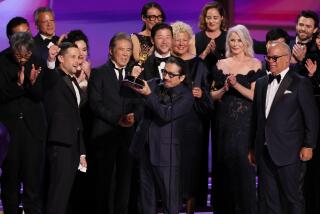The animated ‘Mirai’ takes the life of a real boy and laces it with the fantastical
- Share via
Mamoru Hosoda’s Oscar-nominated animated feature, “Mirai,” tells the tale of Kun, a young boy who doesn’t deal with the arrival of his new baby sister very well. The Japanese filmmaker was inspired by his own ideas of fatherhood and watching his young son interact with their new family member, also named Mirai. And in case you’re curious, yes, though they’ve seen the film as youngsters, he has pondered how they will react upon watching it again when they grow older.
“They saw it, they had a lot of fun. They enjoyed it like normal kids did, but yeah, when they’re teenagers, are they gonna be embarrassed? They might be,” Hosoda acknowledges. “And they’ll probably think differently when they themselves have children, and they will understand what their parents were thinking when they made the movie. [I think] that is when this movie will really be complete.”
“Mirai” is a departure for the 51-year-old director, who had previously spent most of his career working on action adventure and fantasy films. Granted, “Mirai” does includes some fantasy elements, but it is much more focused on the everyday interactions of a young family than his earlier work. Hosoda had his kids relatively late in life and reveals he didn’t used to see becoming a father as a positive experience.
FULL COVERAGE: Get the latest on awards season from The Envelope »
“I used to think having children would be a huge hassle, ‘It’s gonna need a lot of responsibility, it’s gonna cost a lot of money, I’m not gonna get any sleep,’ ” Hosoda says. “And when I had my kids, it was exactly [that], so, yeah, it’s a huge hassle. But little [by little], happiness spending time with my children won over. And then I just started thinking about how happy I was, and I wanted to depict that in the movie, so that’s how I came up with ‘Mirai.’ ”
Kun, says Hosoda, is exactly like his son, who was 3 at the time and was often the inspiration for the picture. Along with his animators, he studied how his son moved and interacted with things, in order to infuse Kun with a detailed realism. And his offspring also provided the genesis for one of the film’s key narrative elements: Kun’s interaction with his relatives from the past and the future. It came about because every day, Hosoda asks his son about his dreams from the previous night. Usually they are about trains, his favorite toy, but one day he gave a much more curious reply.
“‘Actually, oh, I met Mirai’ — that’s my daughter’s name — ‘I met Mirai when she was bigger, like when she was older,’ ” Hosoda recalls his son saying. “I was like, ‘What?’ And then I got jealous, because I want to meet her too when she’s bigger. And then I started to imagine what she would be like, what kind of woman she would grow up into. And that’s how the whole story came about.”
Over the course of the picture, Kun meets not only an older Mirai, but his great-grandfather as a young man and an adult human incarnation of the family’s pet dog, Yukko. Coming up with an emotional narrative was one thing, but convincing his animation partners to go down a less traditional road was something else. His first pitch was met with some guarded skepticism.
“They said, ‘Why don’t you make it into something with an adventure? Maybe have the boy be 6 or 7 years old? Or, maybe have like an incident happen or make the family a little more dramatic.’ But that’s really not what I wanted to do,” Hosoda recalls. “I really wanted to showcase the importance of the little moments in everyday life. There’s no adventure. There’s no drama, and so I was worried. But I think because I went through with this idea, my original concept, I was able to come up with a different movie that everyone is liking. So, it was good.”
“Mirai” first received critical acclaim after it premiered in the Directors’ Fortnight section of the 2018 Cannes Film Festival last May, but some Japanese still find it hard to believe the subject matter translates so well overseas. Immediately before speaking to The Envelope, Hosoda was interviewed by a reporter from NHK, one of the biggest television networks in Japan, and the interviewer was surprised the story was deemed so universal despite so many “Japanese elements.”
“I think that’s usually how most [Japanese] people feel,” Hosoda says. “Like, how could they understand? It’s how Japanese people think. But I really think because it’s based on reality, and my experiences that it’s very authentic and the authenticity shines through even if you [are from a different] culture. And maybe that’s why people are appreciating it.”
More to Read
From the Oscars to the Emmys.
Get the Envelope newsletter for exclusive awards season coverage, behind-the-scenes stories from the Envelope podcast and columnist Glenn Whipp’s must-read analysis.
You may occasionally receive promotional content from the Los Angeles Times.










